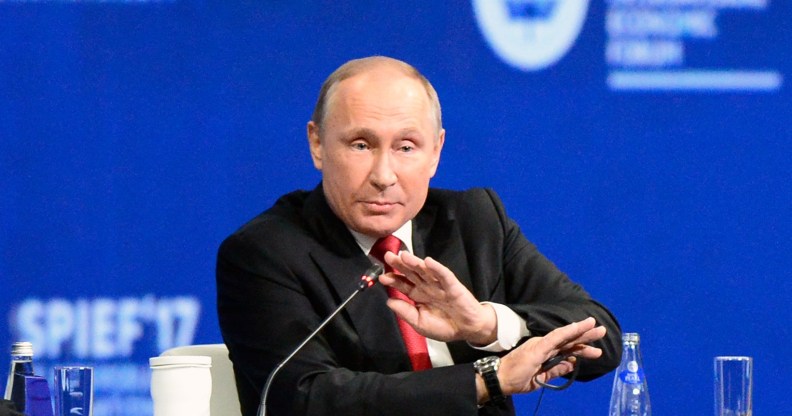Listen: Ukraine is sending this ‘anti-Russia’ song to Eurovision

(Getty)
(Getty)
Ukraine has sparked a diplomatic row – by selecting an ‘anti-Russia’ song for the Eurovision Song Contest.
The country held a national selection show over the weekend ahead of the contest, which is set to take place in May.
The Ukrainian public opted to select Jamala (Susana Jamaladinova) a singer from the contested Crimean peninsula and of Tatar origin.
Despite the contest’s ban on overtly political lyrics, her song 1944 appears to serve as a coded reference to both Vladimir Putin’s interventions in eastern Ukraine, and the policies of Stalin, who purged the Tartars in the 1940s.
The song opens with the lyrics: “When strangers are coming, they come to your house/They kill you all and say/We’re not guilty, not guilty.”
Switching between English and the Crimean Tartar tongue, she sings: “I couldn’t spend my youth there/Because you took away my peace.”
It continues: “Where is your heart, humanity rise/You think you are gods, ha, but everyone dies/Don’t swallow my soul, our souls.”
The song’s choice has sparked outcry in Russia – and is likely to heighten tensions leading up to the contest. Russia is sending Sergey Lazarev to the contest, with a song that is yet to be selected.
Some fans voiced concerns about the Ukrainian entry, and called for it to be thrown out under Eurovision rules banning political messages.
Crimean Tatar leader Mustafa Jamilev said: “There is no mention there about occupation or other outrages that the occupants are doing in our motherland; nevertheless it touches on the issue of indigenous people who have undergone horrible iniquities.”
It is not the first time a country has been accused of taunting Russia through the contest.
Following the Russo-Georgian War, in 2009 Georgia selected Stephane & 3G with the song ‘We Don’t Wanna Put In’ – which attracted attention because of the tendency to mishear ‘Put In’ as ‘Putin’.
Georgia withdrew from the contest after Eurovision bosses demanded the lyrics were changed, which Georgia claims followed pressure from Russia.
The rules are not consistently enforced, however – Finland’s 2013 entry was widely seen as a pro-equal marriage protest song but faced no action.
Russian lawmaker Vitaly Milonov, who masterminded the country’s ‘gay propaganda law’, has repeatedly called for Russia to withdraw from the contest due to its gay content.
Milonov labelled the contest the “Eurovision sodom show”, saying: “Even just broadcasting the competition in Russia could insult millions of Russians.

“The participation of the obvious transvestite and hermaphrodite Conchita Wurst on the same stage as Russian singers on live television is blatant propaganda of homosexuality and spiritual decay.”
Anti-booing’ tech was deployed in 2015’s contest, to avoid repeats of incidents where the Russian act was loudly booed by crowds.
The BBC admitted to removing scenes of Russia being booed over anti-gay laws from the broadcast of a Eurovision anniversary show.

